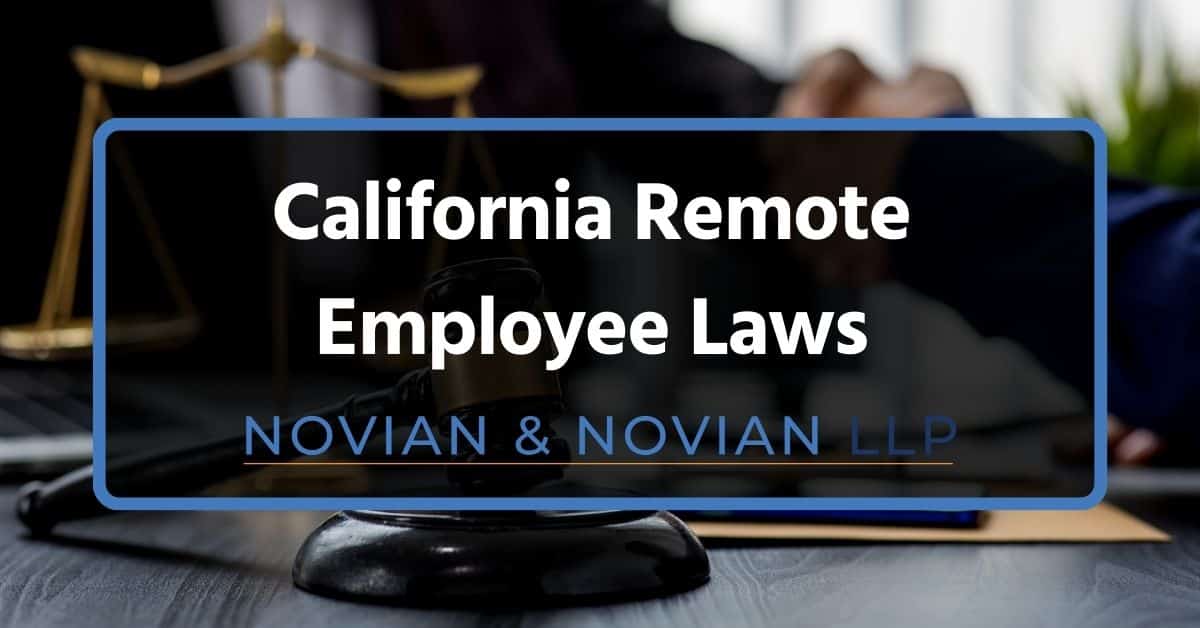
by | Dec 30, 2024 | Employment Law
A defining feature of today’s workspace is that many employers and employees have abandoned the traditional office setting. Instead, remote work has become more prevalent, and we now have work-from-home employees.
California is known for its robust employee protection laws and work-from-home laws, which have specific regulations for remote employees. This new law is crucial for employers to maintain legal compliance and create a positive work experience for those not physically in the office. Some of these laws revolve around workplace safety, minimum age, time off, expense reimbursement, etc. Both California employees and employers should understand these laws to ensure compliance and protect their rights.
At Novian & Novian, we have over 30 years of experience in providing legal services to defend our clients across numerous industries. Our experienced lawyers specialize in employment law and can help ensure your rights and obligations are upheld. Contact us today for a consultation.
This blog post will cover everything from the classification of remote workers to the employment laws for remote work. Its purpose is to inform employers and employees about key legal aspects in employment law cases and the many things an employer considers when creating an effective workplace culture.
Definition of Remote Employees in California
A remote employee is someone who performs their job duties from a location other than a central office operated by an employer. An employer requires remote workers to be able to separate their home life from their work life. A remote employee must not allow their home environment to impede on his or her duties, whilst the employer must provide accurate compensation for the work done.
For a remote employee, the company withholds tax, Social Security, and Medicare from wages paid. Independent contractors do not have their taxes withheld by a company. Independent contractors often own their own businesses and enter into contracts with employers to perform specific duties.
Typically, employment and labor laws do not apply to independent contractors. Employers like to use independent contractors because doing so will allow them to avoid expenses typically associated with an employee, such as training, paid sick leave, promotions, taxes, meal periods, overtime hours, benefits, unemployment insurance, etc.
Wage and Hour Laws for Remote Employees
Under California law, a remote worker receives the same protections and rights as an in-person worker. California employers must ensure compliance for employees working remotely, which includes meal and rest breaks, overtime, paid time off, and any other rights specific to job performance or location.
The Fair Labor Standards Act (FLSA) is a federal labor law enacted in 1938 that establishes certain minimum standards for wages, overtime eligibility, recordkeeping, and child labor. The FLSA is administered and enforced by the Wage and Hour Division (WHD) of the U.S. Department of Labor (DOL).
Key provisions of the Fair Labor Standards Act include:
- Minimum Wage: The FLSA sets the federal minimum wage that nonexempt employees must be paid. The minimum wage is subject to periodic updates by the U.S. government.
- Overtime Pay: The FLSA requires employers to pay eligible employees overtime at a rate of at least one and a half times their regular rate of pay for hours worked in excess of 40 hours in a workweek.
- Recordkeeping: Employers covered by the FLSA are required to maintain certain records related to employees’ wages, hours worked, and other conditions of employment. This helps ensure compliance with the law.
- Exempt and Nonexempt Status: The FLSA classifies employees as either exempt or nonexempt based on criteria such as salary level, salary basis, and job duties. Exempt employees are generally not eligible for overtime pay, while nonexempt employees are eligible.
- Equal Pay: The FLSA includes provisions related to equal pay for equal work, regardless of gender. It prohibits wage discrimination based on sex and requires equal pay for men and women performing substantially similar work.
- Enforcement and Penalties: The DOL’s Wage and Hour Division is responsible for enforcing the FLSA. Employers found in violation of the FLSA may be subject to penalties, fines, and other corrective actions.
California Internet Reimbursement Law (2024)
California Labor Code Section 2802 is the key statute addressing an employer’s obligation to reimburse an employee for necessary expenses. It states that employers must indemnify employees for all necessary expenditures or losses incurred by the employee in direct consequence of the discharge of their duties. These expenses could include Internet and phone bills, work-related equipment (e.g., computers, monitors), office supplies, and mileage or transportation costs.
The California Labor Code states that businesses must reimburse employees for reasonable remote work expenses, which include any losses incurred by the employee while performing their duties. California remote employee laws state that employers must decide which expenses qualify for reimbursement. Typically, the reimbursement amount depends on cell phone data, internet access and WI-FI fees, at-home tech expenses, desktop, laptop, and printer purchases, and any other business expenses.
Health and Safety Regulations
The Occupational Safety and Health Administration (OSHA) outlines specific requirements for maintaining safety in remote work environments. Employers are obligated to extend their commitment to workplace safety to remote settings.
Here are key considerations according to OSHA guidelines:
(a) Safe Work Environment: An employer must ensure that a remote worker is free from recognized hazards that could cause harm. This includes providing necessary equipment and ensuring that the work environment is adequate, thus ensuring safe and healthy practices.
(b) Ergonomics and Equipment: An employer is responsible for evaluating and addressing ergonomic factors in remote workstations. This involves providing suitable furniture, equipment, and accessories to promote comfortable and safe working conditions.
(c) Training and Guidelines: Employers should offer appropriate training to remote workers, outlining safety protocols and guidelines. This may include information on emergency procedures, proper equipment usage, and hazard identification.
(d) Communication: Employers must establish effective communication channels to stay connected with remote workers. This ensures that employees can promptly report safety concerns or incidents, allowing for timely resolution.
(e) Data Security and Privacy: In accordance with OSHA guidelines, employers should implement measures to secure sensitive information and uphold data privacy in remote work settings. This involves secure remote access, data protection training, and clear policies on handling confidential information.
(f) Workers’ Compensation: Remote workers who sustain work-related injuries or illnesses should be informed about the procedures for reporting and filing workers’ compensation claims. Employers must maintain transparency about the available benefits and support for injured or ill remote workers.
(g) Regulatory Compliance: Employers need to comply with relevant OSHA regulations, even in remote work arrangements. This includes staying informed about any updates or changes in OSHA requirements and adjusting policies applying to remote workers accordingly.
By adhering to these OSHA requirements, employers can create and maintain safe remote work environments, prioritizing the health and well-being of their employees.
Employers are responsible for ensuring a secure work environment for remote employees. This includes providing appropriate equipment, ergonomic setups, and resources so that employees can execute their job responsibilities safely. Employers may also need to conduct assessments or keep guidelines for remote workers updated to ensure the maintenance of a safe and healthy workspace.
Additionally, employers should take steps to safeguard sensitive information and guarantee data privacy and security for remote workers. This involves implementing secure remote access systems, offering training on data protection practices, and establishing policies for the handling of confidential information. Adherence to data protection regulations may also be obligatory. In the event of work-related injuries or illnesses, remote workers may qualify for workers’ compensation benefits. Employers should make certain that remote workers are familiar with the procedures for reporting and filing workers’ compensation claims.
Privacy and Data Security Considerations
California employers must ensure the security and confidentiality of sensitive information and follow labor laws. The California Consumer Privacy Act (CCPA) is a data protection law enforced to maintain data security in operations.
Employee privacy rights can vary depending on the jurisdiction, industry, and specific employment agreements. Employers need to be aware of applicable laws and respect the privacy rights of employees. Here are some common considerations related to employee privacy rights:
Privacy Policies: Employers should have clear and transparent privacy policies that outline the types of personal information collected, how it will be used, and any third parties with whom it may be shared.
Consent: Obtain informed consent from employees before collecting and processing their personal information. Clearly communicate the purpose of data collection and seek permission where required.
Monitoring: If monitoring of employees is necessary, employers should communicate the extent and nature of monitoring activities. This includes monitoring electronic communications, office supplies, internet usage, and workplace surveillance.
Data Security: Employers are responsible for protecting employees’ personal information. To safeguard data, implement measures such as encryption, access controls, and secure storage.
Background Checks: When conducting background checks on potential or current employees, adhere to legal requirements and obtain consent. Inform employees about the purpose and scope of the background check.
Personal Devices: Clarify policies regarding the use of personal devices for work-related activities. Balance the need for security with respecting the privacy of personal information on employee-owned devices.
Communications: Monitor employee communications, such as emails and messages. Some jurisdictions have strict rules about intercepting and monitoring electronic communications.
Social Media: Respect employees’ rights to privacy on social media. Avoid requiring employees to provide access to their personal social media accounts, as this may infringe on privacy rights.
Records: Maintain accurate and up-to-date employee records. Employees generally have the right to access their own personnel files, and employers should handle this information responsibly.
Location Tracking: If location tracking is necessary, such as for remote work arrangements, be transparent about the purpose and obtain consent where required.
Training: Educate workers about privacy policies and their rights. This can include training on data protection, acceptable use of technology, and the importance of maintaining confidentiality.
Anti-Discrimination and Harassment Laws
California’s anti-discrimination and harassment laws extend to remote work, ensuring that employers are obligated to maintain a safe and inclusive work environment regardless of their employees’ physical location. Employers must uphold anti-discrimination and harassment policies, conduct training, and promptly address any complaints.
Remote workers are entitled to the same legal protections as regular office employees, safeguarding them from discriminatory practices or harassment based on factors such as race, gender, sexual orientation, or disability. Employers must remain compliant with these laws to foster a work culture that prioritizes equality and protects employees from any form of discrimination or harassment.
Tax Implications for Remote Employees
Employer withholding and reporting obligations include:
Residency Rules:
- California taxes residents on their worldwide income, regardless of where the income is earned.
- Nonresidents are generally taxed only on income earned within the state.
Telecommuting Policies:
- Employers should consider establishing clear policies regarding telecommuting and remote work arrangements to help determine the state in which the employee’s work is performed.
Withholding for California Residents:
- If an employee is a California resident, an employer should continue to withhold California state income tax, regardless of where the work is performed.
Withholding for Nonresidents:
- If an employee is a nonresident of California and works remotely from another state, California may still be able to tax the income if the employee performs services for an employer in California.
- An employer may need to withhold taxes for the state where the services are performed and, in some cases, the state where the employee resides.
Reciprocal Agreements:
- Some states have reciprocal agreements, allowing residents of one state who work in another to be taxed only in their state of residence. However, California generally does not have reciprocal agreements with other states.
Employee’s Responsibility:
- Employees working remotely in a state other than their employer’s location should be aware of their own tax obligations and may need to file income tax returns in both the state where they work and their state of residence.
Recordkeeping:
- An employer should maintain accurate records of where remote workers are performing their work to comply with state tax regulations.
Reporting Obligations:
- An employer may need to report wages paid to remote workers in various states. This reporting may include filing W-2s or equivalent forms with the appropriate state tax authorities.
Creating Compliant Remote Work Policies
Crafting a legally compliant remote work policy involves addressing crucial elements such as labor laws, expense reimbursement, and privacy regulations, ensuring alignment with California’s specific mandates.
Employers should clearly define expectations regarding working hours, breaks, and overtime while also implementing a robust system for reimbursing remote employees for necessary business expenses. Best practices include seeking legal advice to tailor policies to individual and organizational needs, staying informed on evolving remote work laws and fostering open communication with employees to maintain a legally sound and supportive remote work environment.
Case Studies: Navigating Complex Scenarios
Remote work presents a myriad of legal challenges spanning privacy, wage and hour compliance, and discrimination, exemplified by lawsuits over overtime compensation arising from blurred work-life boundaries. Data security concerns arise due to personal device use, potentially resulting in legal consequences for compromised sensitive information. Workplace discrimination in virtual settings necessitates proactive company measures, while challenges related to remote monitoring policies, accommodation of disabilities, and compliance with state employment laws further contribute to the complex legal landscape of remote work.
To accommodate the fact that employment law is constantly evolving, employers must communicate clearly with their employees, offer flexible work hours, offer remote onboarding, provide regular feedback, follow local ordinances, and have data protection and compliance regulations in place.
Want To Know More About California Work From Home Law 2024?
Understanding and complying with California’s remote employee laws is essential for both employers and employees to maintain a legally sound and productive work environment. From wage and hour requirements to expense reimbursements and workplace safety, California’s stringent regulations leave little room for error. Employers who fail to adhere to these laws risk costly legal disputes, while employees may miss out on the protections they’re entitled to under state law.
To navigate these complexities effectively, it is a smart choice to seek professional legal guidance from an employment attorney. Novian & Novian has extensive experience in California employment law and can help you address critical issues like expense reimbursement, worker classification, and labor standards compliance. If you believe that your employer is not complying with California’s remote laws, contact us today!
Contact Us
Have questions about this post? Novian & Novian is a full service law firm in Los Angeles with clients that span the country. Contact us today for a free consultation.
Contact Us
Have questions about this post? Novian & Novian is a full service law firm in Los Angeles with clients that span the country. Contact us today for a free consultation.




